Papers by Michael Neocosmos
Hjalmar Jorge Joffre-Eichhorn & Patrick Anderson (eds.) Lenin (1870-1924) the Heritage we (don’t) Renounce, Daraja Press, Kickass Books, 2024
A brief discussion of Lenin's political dialectic
Hjalmar Jorge Joffre-Eichhorn & Patrick Anderson (eds.) Lenin 150 (2nd edition revised and updated) Daraja Press, 2021., 2021
(eds.) Lenin 150 (2 nd ediDon revised and updated) Daraja Press, 2021. Don't be afraid of the peo... more (eds.) Lenin 150 (2 nd ediDon revised and updated) Daraja Press, 2021. Don't be afraid of the people's ini2a2ve and independence. Put your faith in their revolu2onary organisa2ons [...] Lack of faith in the people, fear of their ini2a2ve and independence, trepida2on before their revolu2onary energy instead of all-round and unqualified support for it-this is where the S.R. and Menshevik leaders have sinned most of all. 1 Poli2cs must take precedence over economics. To argue otherwise is to forget the ABC of Marxism. 2
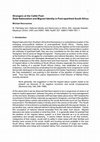
M. Palmberg (ed.) National Identity and Democracy in Africa, NAI, Uppsala Sweden, Mayibuye Centre, UWC and HSRC 1999. Pp287-327. ISBN 0-7969-1901-1, 1999
Migrant labourers from Southern Africa find themselves in a contradictory location in the emergin... more Migrant labourers from Southern Africa find themselves in a contradictory location in the emerging socio-political relations of post-apartheid South Africa. Having been celebrated in cultural and academic discourse during the eighties as the most exploited among the oppressed majority, as the bearers of the cross of the migrant labour system the mainstay of apartheid itself, they are now considered by the new state at best as 'foreigners' and at worst as 'illegal immigrants'. Having been as workers on the mines, at the forefront of the struggles for unionisation and national liberation, their position in the matrix of policies and ideologies developed by the new state on the one hand and by their employers on the other, seems more and more insecure.

Africa Development, 2014
Freedom is not identitarian; it is at the very least an inflexion of, at most a rupture with the ... more Freedom is not identitarian; it is at the very least an inflexion of, at most a rupture with the identitarian register, insofar as the latter is a prescription of the Other (Alain Badiou Séminaire 2011-12, 18 April 2012. My translation). At the present time, the world is at an impasse. This can only mean one thing: not that there is no way out, but that the time has come to abandon all the old ways, which have led to fraud, tyranny, and murder (Aimé Césaire letter to Maurice Thorez, 24 October 1956). The freedom which Africa was to attain with liberation from colonialism had originally promised to emancipate all the people of the continent from poverty and oppression. Yet anyone can observe that this has not happened. Uhuru is still elusive; freedom seems unattainable. Nationalist, socialist and neo-liberal conceptions of human emancipation have all failed to provide a minimum of freedom for the majority of Africans who are living under conditions which worsen daily as the crisis of...
Journal of Asian and African Studies, 2021
Through a review of the two works below, I discuss how the Saint Domingue/Haiti revolutions clari... more Through a review of the two works below, I discuss how the Saint Domingue/Haiti revolutions clarify the history of the opposition between popular sovereignty and state sovereignty. The people and the state developed as distinct political actors throughout the nineteenth century. The former constructed a completely new society founded on egalitarian norms influenced by African cultures. The latter failed to establish its sovereignty and reverted to a colonial form thus illustrating the core characteristics of the neocolonial state now widespread in the Global South in general and in Africa in particular.
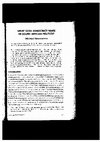
Grace and Truth, 2014
This article advances the position that the main obstacle in understanding a politics of emancipa... more This article advances the position that the main obstacle in understanding a politics of emancipation is a conceptual one. On the one hand the term democracy is used to denote parliamentarianism which operates at the level of the stateand is based on the power to manage differencesand interests so that the system holds together in the interests of dominant capitalism. The second use of the term denotes a form of politics or political practice deployed by people themselvesin organisations, in making decisions and so on.Here democracy is a means 'of promoting an active popular presence in the field of politics'. If a politics of emancipationis what we are striving towards then we should take seriously the second use of the term and think politics 'at a distance from the state'. This would challenge current state modes of rule and will focus the sate to listen and acceptan alternative perspective of equality.
Politeia, 2004
Review article of State of the Nation: South Africa 2003-2004
This review examines the extent to ... more Review article of State of the Nation: South Africa 2003-2004
This review examines the extent to which this volume has provided a critical analysis and evaluation of state power in the post-apartheid period as it is, after all, the state that is overwhelmingly responsible for the state of the nation, very much as its predecessor was. I argue that, unfortunately, with a few exceptions, this book is unable to reach beyond the theoretical platitudes of state hegemonic discourse and, as a result, fails to open new intellectual vistas and exciting possibilities for thinking about the country and its potentially democratic future.
The International Journal of Interdisciplinary Social Sciences: Annual Review, 2009
M. Endo, A.K. Onoma and M.neocosmos (eds) African Politics of Survival: extraversion and informality in the dontemporary world, 2021
This chapter forms part of an edited collection. It brings together ideas scattered in earlier w... more This chapter forms part of an edited collection. It brings together ideas scattered in earlier work and illustrates the latent universalism existing in African popular cultures
H.Jacklin and P. Vale eds. Re-imagining the Socia lin South Africa: critique and post-apartheid knowledge, Pietermaritzburg: UKZN Press., 2009
This paper published in an edited collection in 2091 is primarily focussed on providing a brief i... more This paper published in an edited collection in 2091 is primarily focussed on providing a brief introduction to the thought of Sylvain Lazarus in his book Anthropology of the Name
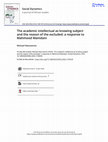
Social Dynamics: A Journal of African Studies, 2020
ABSTRACT
Mamdani’s review of my book Thinking Freedom in Africa
remains within the analytical bin... more ABSTRACT
Mamdani’s review of my book Thinking Freedom in Africa
remains within the analytical binaries which characterise his
thinking. As a result he fails completely to comprehend my
argument. The problem is compounded by the fact that he
seems, at best, to have read the book only partially. I do not
oppose “differences” to “universal humanity”, but argue that in
order to understand a politics of emancipation on the African
continent, one must begin from those exceptional cases when
people themselves invent collective dialectical thought, in other
words when they exceed subjectively their interests as determined
by their social place. This is the case when they think
universal equality which they always do through the prism of
the particular. I thus oppose dialectical thought to Mamdani’s
taxonomic fury. One of the problems with the Social Sciences
including the discipline of History, I argue, lies in their inability
to jettison a concept of representation through which collective
political subjectivities are simply reduced to the actors’ social
place. As a result people are denied the ability to think for
themselves and thus their own emancipation. In fact all people
have the capacity to think their own emancipation, yet such
occurrences remain exceptional.
Eastern Africa Social Science Research Review, 1990

Philosophy Today, 2018
Africans have universally been considered as victims rather than as subjects of history. This art... more Africans have universally been considered as victims rather than as subjects of history. This article show how this view is false with reference to the case of the popular struggle in South Africa during the 1980s. After discussing some fundamental concepts developed in Badiou’s thought of politics and Lazarus’s theorisation of modes of politics, this article examines at some depth some of the features of the event of 1986–1987 in South Africa in which an excessive subjectivity was inaugurated through a mode of politics which challenged the militaristic conceptions of the national liberation struggles of the 1950s and 1960s. This event arguably pointed the way to a new mode of politics for the twenty-first century on the African continent which we saw manifested later in North Africa in 2011. The contradictions of this mode of politics are brought out in order to account for its saturation while its reactive subjectivity is accounted for in terms of a politics of representation which gradually established its dominance over popular affirmative politics.
Revista Plural, 2018
A dialética da política emancipatória e os limites analíticos das ciências sociais: GEAC dialoga ... more A dialética da política emancipatória e os limites analíticos das ciências sociais: GEAC dialoga com Michael Neocosmos.
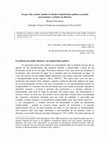
Para o colonizado, a objetividade está sempre dirigida contra ele. (Fanon, 1990: 61) Há uma histó... more Para o colonizado, a objetividade está sempre dirigida contra ele. (Fanon, 1990: 61) Há uma história do Estado, mas não há uma história da política. (Badiou, 1992: 234) O problema da análise histórica e da subjetividade política Se quisermos pensar uma política de emancipação onde as próprias pessoas são os agentes da sua transformação, não podemos abordar a subjetividade a partir da sua localização social ou do seu lugar. Precisamos pensá-la como uma forma de resistência à localização, uma subversão do lugar. Se as tomamos pela sua localização ou lugar, " as vozes das pessoas ou suas subjetividades aparecerão como meras expressões naturalizadas e homogeneizadas desses lugares " (Ross, 2009:21). Não quero dizer com isso que a localização não importe. Pelo contrário, é apenas a partir da subversão subjetiva do lugar, de um posicionamento externo a ele, que a localização e o seu questionamento podem ser compreendidos. E é somente com este movimento que o novo pode ser pensado. Quando os oprimidos recusam e resistem à opressão, eles posicionam a si mesmos, subjetiva e politicamente, para além do lugar da opressão. Em muitos casos, este deslocamento é, inclusive, físico. Ao fazer isso, eles tornam visível a opressão e forçam uma reconsideração das categorias conceituais utilizadas para dar conta da realidade. A escravidão, por exemplo, só pôde começar a ser plenamente compreendida como uma relação opressiva – e, em consequência, a verdade universal da humanidade só pôde ser plenamente compreendida – quando os escravos foram capazes de posicionar a si mesmos subjetivamente fora de um local fundado, em todos os seus aspectos, na desumanidade. Eles atuaram sobre este lugar, afirmando a universalidade do ser humano, como os africanos escravizados fizeram em Santo Domingo de 1791 a 1804 1. Em outras palavras, há



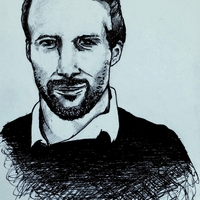






Uploads
Papers by Michael Neocosmos
This review examines the extent to which this volume has provided a critical analysis and evaluation of state power in the post-apartheid period as it is, after all, the state that is overwhelmingly responsible for the state of the nation, very much as its predecessor was. I argue that, unfortunately, with a few exceptions, this book is unable to reach beyond the theoretical platitudes of state hegemonic discourse and, as a result, fails to open new intellectual vistas and exciting possibilities for thinking about the country and its potentially democratic future.
Mamdani’s review of my book Thinking Freedom in Africa
remains within the analytical binaries which characterise his
thinking. As a result he fails completely to comprehend my
argument. The problem is compounded by the fact that he
seems, at best, to have read the book only partially. I do not
oppose “differences” to “universal humanity”, but argue that in
order to understand a politics of emancipation on the African
continent, one must begin from those exceptional cases when
people themselves invent collective dialectical thought, in other
words when they exceed subjectively their interests as determined
by their social place. This is the case when they think
universal equality which they always do through the prism of
the particular. I thus oppose dialectical thought to Mamdani’s
taxonomic fury. One of the problems with the Social Sciences
including the discipline of History, I argue, lies in their inability
to jettison a concept of representation through which collective
political subjectivities are simply reduced to the actors’ social
place. As a result people are denied the ability to think for
themselves and thus their own emancipation. In fact all people
have the capacity to think their own emancipation, yet such
occurrences remain exceptional.
This review examines the extent to which this volume has provided a critical analysis and evaluation of state power in the post-apartheid period as it is, after all, the state that is overwhelmingly responsible for the state of the nation, very much as its predecessor was. I argue that, unfortunately, with a few exceptions, this book is unable to reach beyond the theoretical platitudes of state hegemonic discourse and, as a result, fails to open new intellectual vistas and exciting possibilities for thinking about the country and its potentially democratic future.
Mamdani’s review of my book Thinking Freedom in Africa
remains within the analytical binaries which characterise his
thinking. As a result he fails completely to comprehend my
argument. The problem is compounded by the fact that he
seems, at best, to have read the book only partially. I do not
oppose “differences” to “universal humanity”, but argue that in
order to understand a politics of emancipation on the African
continent, one must begin from those exceptional cases when
people themselves invent collective dialectical thought, in other
words when they exceed subjectively their interests as determined
by their social place. This is the case when they think
universal equality which they always do through the prism of
the particular. I thus oppose dialectical thought to Mamdani’s
taxonomic fury. One of the problems with the Social Sciences
including the discipline of History, I argue, lies in their inability
to jettison a concept of representation through which collective
political subjectivities are simply reduced to the actors’ social
place. As a result people are denied the ability to think for
themselves and thus their own emancipation. In fact all people
have the capacity to think their own emancipation, yet such
occurrences remain exceptional.